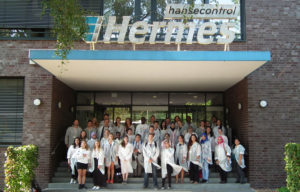By Maegan Murray, WSU Tri-Cities
 RICHLAND, Wash. – A doctoral student at Washington State University Tri-Cities is one of 15 worldwide, and the only U.S. student, selected to participate in a recent week-long school in Germany about developing safe, reliable chemicals in a sustainable way.
RICHLAND, Wash. – A doctoral student at Washington State University Tri-Cities is one of 15 worldwide, and the only U.S. student, selected to participate in a recent week-long school in Germany about developing safe, reliable chemicals in a sustainable way.

“One of the biggest challenges for sustainability sciences is to find solutions that do not threaten economic growth, the environment and public welfare,” said Lei Zhu, who studies biological systems engineering at WSU Tri-Cities. “In particular, developing countries are seemingly faced with the dilemma of economic growth versus sustainability. Sustainability sciences is all about coming up with ways out of dilemmas.”
Participants studied the scope and benefits of sustainable chemistry in value chains and in chemicals in products at the Summer School on Sustainable Chemistry for Sustainable Development, Zhu said.
One purpose of the school is for students to bring their unique experiences from various countries for discussions on approaches and solutions to substitute hazardous chemicals for safe and reliable chemicals in products, he said.
At WSU, Zhu works under the guidance of associate professor Hanwu Lei to find an ideal and less expensive catalyst for converting biomass into biofuel and value added chemicals.
News media contacts:
Lei Zhu, WSU Tri-Cities biological systems engineering, 509-372-7623, lei.zhu@wsu.edu
Maegan Murray, WSU Tri-Cities public relations specialist, 509-372-7333, maegan.murray@tricity.wsu.edu





